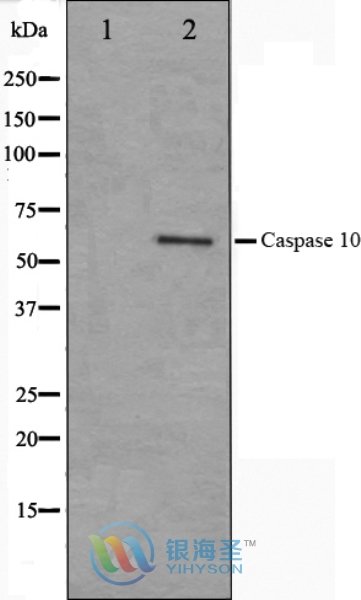ARP843-61
[Polyclonal Antibody]
Caspase 10 Rabbit Polyclonal Antibody

www.yhsbio.com
market@yhsbio.com
support@yhsbio.com
+86-21-54651191
Room 703,Building 6,333# Guiping
Rd.,Xuhui District,Shanghai,China
market@yhsbio.com
support@yhsbio.com
+86-21-54651191
Room 703,Building 6,333# Guiping
Rd.,Xuhui District,Shanghai,China
DATASHEET
| Species: | Rabbit |
| Applications: | WB IHC IF ICC |
| Immunogen Range: | A synthetic peptide derived from human Caspase 10 |
| Clonality: | Polyclonal Antibody |
| Isotype: | IgG |
| GENE ID: | 843 |
| Swiss Prot: | Q92851-2/4 |
| Synonyms: | ALPS2, Apoptotic protease Mch-4, CASP-10, CASP10, CASPA, caspase 10, apoptosis-related cysteine peptidase, caspase 10, apoptosis-related cysteine protease, Caspase-10, Caspase-10 subunit p12, Caspase-10 subunit p23/17, FADD-like ICE2, FAS-associated death |
| Purification: | Affinity chromatography |
| Storage: | Store at -20°C or -80°C in PBS with 0.02% sodium azide and 50% glycerol. Avoid freeze/thaw cycles. |
| Background: | Casp10 Involved in the activation cascade of caspases responsible for apoptosis execution. Recruited to both Fas- and TNFR-1 receptors in a FADD dependent manner. May participate in the granzyme B apoptotic pathways. Cleaves and activates caspase- 3, -4, -6, -7, -8, and -9. Hydrolyzes the small- molecule substrates, Tyr-Val-Ala-Asp-|-AMC and Asp-Glu-Val-Asp-|-AMC. Belongs to the peptidase C14A family. Heterotetramer that consists of two anti-parallel arranged heterodimers, each one formed by a 23/17 kDa (p23/17) (depending on the splicing events) and a 12 kDa (p12) subunit. Self-associates. Interacts with FADD and CASP8. Found in a Fas signaling complex consisting of FAS, FADD, CASP8 and CASP10. 6 isoforms of the human protein are produced by alternative splicing. |
| Caculated MW: | 60 kDa |
| Observed MW: | Refer to Figures |
| Applications: |
WB 1:500-1:3000 IHC 1:50-1:200 IF 1:100-1:500 ICC 1:100-1:500 |
| Reacitivity: | Human |
For research use only. Not intended for diagnostic or therapeutic use!
Additional information
